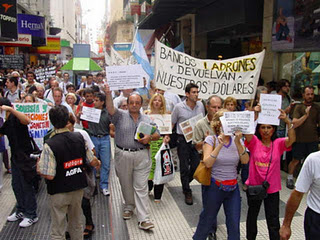
Argentina's crash of 2001 is a preview of what is happening today in Greece now and might happen in US next. I notice that our government has been passing some interesting laws that would allow for capital controls to be implemented easily, press freedoms controlled and the right to protest curtailed. (You only have to look at the military style police response to the OWS peaceful protests that was coordinated by the DHS to see where we are heading.
What happened in Argentina in 2001 was a mess. I have met several Argentinians in my travels who were living there during the crash and they told me of very serious problems with banks, crime and high unemployment. That is what Greek-American's have told me is happening in Greece now. And is a possibility here in USA next. More on one family's experience in Argentina here
Additionally when I traveled from Argentina in October 2011 to next door Brazil I had some difficulty exchanging my Argentinean peso for Brazilian Reals - the first two currency exchange places wouldn't take them at all at any exchange rate. Suggests to me that Brazil doesn't regard the Argentinian economy so highly.
BTW I had a wonderful time in Argentina and will be happy to visit again. The people are friendly and the land I saw was beautiful.
Nearly 10-years ago to the day, the government of Argentina collapsed. Beset by weighty deficit spending and a completely unrealistic currency peg to the US dollar, Argentina became the poster child for the golden rule of economics: 'that which is unsustainable will not be sustained.' It's reversion to the mean.
Within a matter of days, the country had burned through several presidents, the currency collapsed, inflation soared, unemployment shot up, crime rates spiked, and the government defaulted on its debt.
After limping along for most of the last decade with a socialist agenda, the government of Argentina is at it again. The economy is rapidly deteriorating, and street-inflation has surpassed 25%.
Naturally, the administration of President Cristina Fernandez insists that inflation is not a problem, despite the Argentine peso losing 25% of its value against the US dollar over the last three-years (and far more against gold).
Meanwhile, Fernandez has borrowed her plays from Atlas Shrugged. She's imposed capital controls, raided pension funds, nationalized private property, and taken control of the media... all in a vain attempt to delay the endgame.
A few weeks ago, the government passed a package of new laws, essentially criminalizing public protest under the auspices of combating terrorism. The legislation, snuck in at a midnight session during the holiday period, provides severe punishment for various crimes under a very broad definition of terrorism.
Fernandez herself maintains that the law would -never- be invoked to restrict the legitimate rights of Argentines. This, from a woman who simultaneously passed legislation to seize control of the country's newspaper industry.
In her latest move, Fernandez has stepped up her saber-rattling over the Falkland Islands, a nearby archipelago that has been a British territory since 1833 (it is now self-governing). You may remember that Argentina invaded the Falklands in 1982 and was subsequently defeated after a bloody conflict with Britain.
It's a sore subject in Argentina; the government still claims sovereignty over the Falklands (known as Las Malvinas in Argentina), and Fernandez is waving the flag once again.
Last month Argentine naval forces were sent to frustrate commercial fishing around the disputed territory. And in the most recent development, Argentina, Brazil, and Uruguay announced that they were closing their seaports to any ship flying a Falklands flag (all 25 of them...)
Argentina has also mounted pressure on the British government to reopen negotiations over the Falklands' sovereignty. Thus far, the Brits have refused.
Cristina Fernandez's BFF Hugo Chavez recently added to tensions by saying, "The English are still threatening Argentina. Things have changed. We are no longer in 1982. If conflict breaks out, be certain Argentina will not be alone, as it was back then."
At this point, it's all just tough talk and petty annoyances. But here's the thing-- there are four billion barrels of oil estimated to be within the Falklands' territorial waters.
Given the utter insanity with which Fernandez governs her country and the desperation in the Argentine economy, one cannot rule out the possibility of her trying to grab Las Malvinas by force. After all, military conflict is the ultimate social distraction.
I've often written that economics drives everything. A solid, vibrant, competitive economy lifts an entire nation into prosperity, while deteriorating fundamentals and a socialist agenda create inflation, unemployment, and social turmoil.
War is just another one of those consequences. And given the vast deterioration in the global economy coupled with deeply-seeded conflicts around the world, the Falklands is just one of many that we may have to look forward to in 2012.
Until tomorrow,
Simon Black
Senior Editor, SovereignMan.com
VIEW A PREVIEW OF THIS MONTH'S SOVEREIGN MAN: CONFIDENTIAL
The world is changing daily. 'Solutions' to government debt problems now delay the inevitable for minutes rather than weeks and months.
Simon spends this month getting a grasp on how some of the most experienced experts predict the outcome. He doesn't forget to interview someone who has lived through crisis.
Each provides their action plan to survive and thrive.
Simon wanted to give you a preview so you can read the details for yourself.
